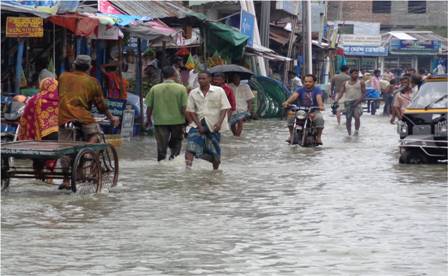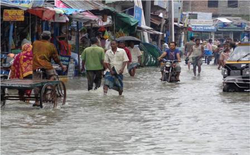Helping cities gain access to adaptation financing

With support from the Rockefeller Foundation and in the framework of the Asian Cities Climate Change Resilience Network (ACCCRN) ICLEI South Asia assisted three cities in India (Bhubaneswar, Mysore and Shimla) to develop climate resilience strategies based on the assessment of the climate threats they were facing and the anticipated impacts on their vulnerable urban systems and social groups. For this, ICLEI South Asia adopted a methodology called the ICLEI ACCCRN Process (IAP), a toolkit that analyses urban systems likely to be impacted by climate change, identifies strategies to tackle the impact, conducts assessments to detect greatest vulnerabilities and helps cities prepare climate resilient strategies.
To bring this to the next level, ICLEI South Asia, in collaboration with ADAPT Asia Pacific and Cities Development Initiative for Asia (CDIA), has now laid the path for helping cities move from climate resilience strategies and project preparation to gaining access to finance by introducing the Climate Change Adaptation Project Preparation and Financing in Urban India.
Bhubaneswar, Mysore and Shimla will again be the focus of the initiative, which is planning to:
- Review and prioritise identified resilience interventions
- Conduct prefeasibility studies on priority themes that would enable the cities to leverage partnerships for the next phase of project development, which could be a full-blown feasibility study or direct financing for particular investment opportunities.
As part of the assessments already undertaken in the three selected cities, a prioritised basket of resilience building interventions is already available. This project will now assess how investable a selection of these interventions is, in terms of social, environmental (including climate change), economical, financial and technical considerations. ICLEI South Asia, with support from CDIA and ADAPT Asia-Pacific, will work closely with the Climate Core Teams and Stakeholder Groups that were established by the city governments while implementing the IAP to complete the project in two phases:
- Phase I: Prioritization
- Phase II: Pre Feasibility Study (PFS).
Towards this end, the project will follow, and adapt where necessary, the relevant tools and guidelines developed by CDIA.
As a preliminary project kick-off, seven ICLEI staff representing four ICLEI offices attended a training organized by CDIA on their City Infrastructure Investments Prioritization and Programming (CIIPP) and Pre-Feasibility Studies (PFS) toolkits and approaches in January 2014 in Bangkok, Thailand. The CIIPP aims to assist cities and municipalities in coming up with a prioritized list of urban infrastructure investments. CIIPP is an Excel-based tool with three components comprised of 1) financial capacity analysis, 2) project prioritisation, and 3) programming for investment. PFS is a preparatory study which aims “to formulate an integrated, inclusive, and sustainable project that addresses potential institutional, technical, financial, economic, social, and environmental concerns.”
The project aims to complete the adaptation pathway by providing linkages to national schemes and other potential donors and defining appropriate mechanisms, thereby meeting demands of both the cities and financiers.
